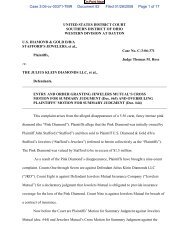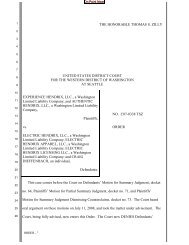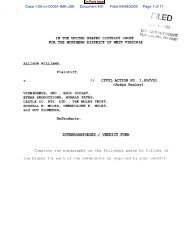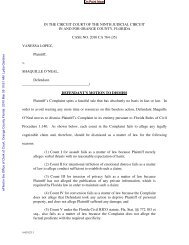GORDON KEENE VELLA. - On Point News
GORDON KEENE VELLA. - On Point News
GORDON KEENE VELLA. - On Point News
You also want an ePaper? Increase the reach of your titles
YUMPU automatically turns print PDFs into web optimized ePapers that Google loves.
amnesia.” (Report at 2.) Similar reference to this study is made in his book to the effect that<br />
“amnesia for Nazi Holocaust experiences has also been reported.” However, that<br />
characterization of the study’s findings is misleading, at best. In that regard, the study noted a<br />
“remarkable degree of remembering” when comparing the survivors’ current recollections of<br />
their internment with depositions that they had provided shortly after their liberation. The study<br />
did not note “dissociative amnesia.” (McNally Decl. 8.) The study’s authors remarked that<br />
“There is no doubt that almost all witnesses remember Camp Erika in great detail, even after 40<br />
years” (p. 84). (Id.) It is simply inexplicable that Dr. Brown would cite this study as supportive<br />
of the hypothesis of “dissociative amnesia” when the study apparently contradicts the theory.<br />
In summary, the instances documented above reveal an extensive pattern of<br />
misrepresentation with regard to the peer review publications that support his theory of traumatic<br />
amnesia and dissociative amnesia. There can be little question that the purpose of these<br />
erroneous citations was to bolster the “reliability” and “relevance” of his theory, when in fact<br />
these very studies either reach conclusions contrary to that theory or completely fail to address<br />
the point. What is most significant here is that he was under no obligation to cite these studies.<br />
But, having done so, he was assuredly under an obligation to truthfully represent the nature of<br />
the study and the conclusions reached therein. The misrepresentations constitute grounds for<br />
vacating the judgment under Rule 60(b).<br />
C. Dr. Brown Misrepresented That the Theory of Dissociative Amnesia Is<br />
Generally Accepted by the Relevant Scientific Community.<br />
Dr. Brown also testified that the dissociative amnesia hypothesis is “generally accepted”<br />
amongst the relevant scientific community; however, that assertion is patently false. At best, this<br />
issue represents a heated controversy within the relevant scientific community – perhaps more<br />
- 20 -
















